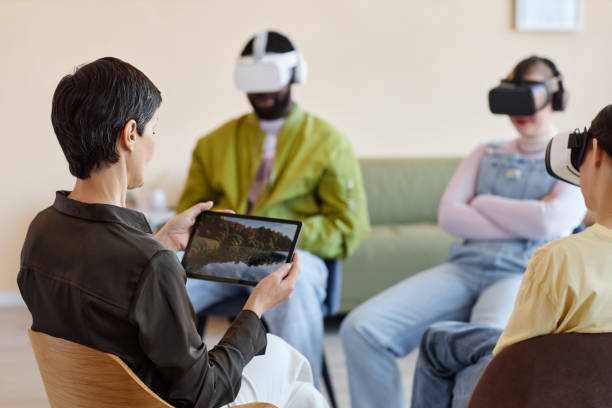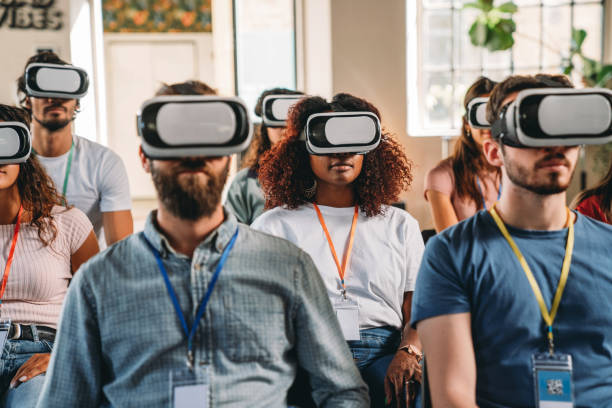Expressive Arts Therapy, Mental Well-Being, Research
Future of Virtual Reality Therapy
With virtual reality, you can experience the future of therapy. As technology advances, virtual reality (VR) is becoming a more popular tool for mental health. Consider confronting and overcoming your anxieties, managing stress and anxiety, or even navigating traumatic situations in a secure and controlled virtual environment. The options are limitless.
Virtual reality therapy is changing the way we treat mental health by combining cutting-edge technology and therapeutic practices. Individuals can use VR headsets and immersive simulations to transport themselves to various circumstances, allowing them to tackle their fears and anxieties in a controlled and supervised manner. Exposure treatment can be extremely effective in treating phobias, PTSD symptoms, and other mental health issues.
Virtual reality therapy is not only a novel and exciting technique of treatment, but it also gives therapists significant insights into their patients’ experiences. Therapists can acquire a better grasp of their patients’ needs and progress by tracking their reactions and responses in a virtual environment.

Benefits of Virtual Reality Therapy
Virtual reality therapy provides several benefits, making it an appealing alternative for mental health treatment. For starters, it creates a secure and controlled setting in which people can confront their fears and worries. Traditional exposure therapy frequently uses real-life scenarios, which can be difficult or even dangerous for some patients. Virtual reality therapy provides for more regulated and progressive exposure, ensuring the individual’s safety throughout the procedure.
Furthermore, virtual reality treatment provides a level of immersion and engagement that conventional therapeutic approaches may lack. Being totally immersed in a virtual world can improve therapy effectiveness by giving patients a sense of presence and reality. This increased engagement can result in greater outcomes and a more enjoyable treatment experience.
Another benefit of virtual reality therapy is its adaptability. It can be used to treat a variety of mental health issues, including phobias, anxiety disorders, PTSD, and substance abuse. The capacity to adjust virtual settings to specific triggers or scenarios enables therapists to develop personalized treatment programs for each client, hence increasing therapy effectiveness.
Current Applications of Virtual Reality Therapy
Virtual reality treatment is currently being employed in a variety of therapeutic and non-clinical situations. One such application is the therapy of phobias. By simulating phobic circumstances in a virtual world, people can gradually expose themselves to their phobias and learn coping methods to manage their discomfort. This technique has demonstrated good effects in terms of lowering phobia-related symptoms and boosting general well-being.
Virtual reality therapy is also used in the treatment of PTSD. Individuals can confront and process their painful experiences safely and guided by recreating them in a controlled virtual environment. This exposure therapy strategy has been demonstrated to alleviate PTSD symptoms and enhance quality of life for many people.
Virtual reality therapy is also being researched as a stress-reduction and relaxation technique. Virtual settings can be created to encourage relaxation and offer people a virtual respite from their daily stresses. This immersive experience can help people learn and practice relaxation techniques, ultimately enhancing their capacity to manage stress in everyday situations.

The Potential of Virtual Reality Therapy in Mental Health Treatment
Virtual reality therapy has enormous potential as a mental health treatment. As technology advances, the potential for creating more realistic and immersive virtual environments expand. This creates chances for more effective and tailored treatment choices.
One promising field is the treatment of social anxiety disorder. Virtual reality treatment can imitate social circumstances, allowing people to practice social interactions and gain confidence in a controlled setting. This technique has the potential to significantly enhance the lives of those suffering from social anxiety, allowing them to overcome their concerns and acquire greater social skills.
Virtual reality therapy has also shown promise in the realm of addiction treatment. Individuals can learn and practice coping techniques for resisting cravings and avoiding relapse by constructing virtual environments that resemble real-life substance addiction triggers. This immersive approach has the potential to improve established addiction treatment methods and long-term recovery outcomes.
Challenges and Limitations of Virtual Reality Therapy
While virtual reality therapy has many potential benefits, it does confront some problems and restrictions. One major issue is the cost of equipment and software. VR headsets and specific software might be costly, making them less accessible to some people and healthcare organizations. However, as technology progresses and gets more accessible, this barrier is expected to fall.
Another difficulty is the lack of skilled experts capable of efficiently implementing virtual reality treatment in a therapeutic setting. Therapists and mental health professionals require specialized training to understand and apply virtual reality therapy approaches. Ensuring a sufficient number of qualified experts is critical to the general adoption and effectiveness of virtual reality therapy.
When it comes to virtual reality therapy, ethical considerations are also crucial. In rare situations, people may become overly immersed in the virtual world, blurring the barrier between reality and simulation. Therapists must carefully monitor and advise clients throughout the therapy process to ensure their safety and well-being.

Current Research and Advancements in Virtual Reality Therapy
Virtual reality therapy is a fast emerging discipline, with constant research and breakthroughs broadening its possibilities. Researchers are looking at novel applications for virtual reality therapy, such as treating eating disorders, ADHD, and cognitive impairments. The potential to construct personalized virtual worlds tailored to individual illnesses opens up new avenues for future treatment choices.
Technological advancements are also contributing to the progress of virtual reality therapy. Improvements to VR headset design, visuals, and haptic feedback technologies improve the overall immersion and realism of virtual environments. These innovations make therapy more effective and entertaining.
Furthermore, academics are investigating the use of artificial intelligence (AI) into virtual reality therapies. Artificial intelligence systems can give real-time analysis of a patient’s physiological and emotional responses during therapy sessions. This information can assist therapists acquire insight into a patient’s progress and modify treatment programs accordingly, resulting in more personalized and effective therapy.
How Virtual Reality Therapy Can Revolutionize the Healthcare Industry
The potential influence of virtual reality therapy on the healthcare business is huge. Virtual reality therapy has the potential to transform how we address and manage mental health disorders by providing an innovative and effective method to treatment.
Virtual reality therapy can assist bridge the gap between traditional treatment and real-life events by offering clients a secure and controlled setting in which to practice new coping methods and skills. This strategy has the potential to dramatically reduce the time and money needed for traditional therapy procedures, making mental health care more accessible and efficient.
Virtual reality treatment can also be used in telehealth services, allowing patients to access therapy remotely. This is especially advantageous for people living in rural or underdeveloped areas, who may have limited access to mental health services. Virtual reality therapy can bring therapy sessions right to the patient’s home, giving convenient and effective treatment options.

Integrating Virtual Reality Therapy into Clinical Practice
To integrate virtual reality therapy into clinical practice, mental health practitioners, technological specialists, and researchers must work together. Creating established norms and guidelines for the use of virtual reality treatment is critical to ensuring its effectiveness and safety.
Mental health practitioners should receive virtual reality therapy training and education so that they may properly implement this treatment method into their practice. Continued study and evaluation of virtual reality therapy outcomes is also required to provide a strong evidence foundation and improve treatment regimens.
Furthermore, healthcare facilities must invest in the required hardware and software to facilitate virtual reality therapy. This includes VR equipment, software licenses, and continuing technical support to ensure a smooth and consistent therapy experience for both therapists and patients.
Training and Education for Virtual Reality Therapy Practitioners
As the field of virtual reality therapy expands, the necessity for skilled practitioners becomes more pressing. Mental health professionals who want to include virtual reality treatment into their practice should get specific training and education in this field.
Training programs should include theoretical foundations of virtual reality treatment, practical application approaches, and ethical issues. Hands-on experience with VR equipment and simulations is essential for developing the skills required to provide effective virtual reality treatment to clients.
Furthermore, continuous professional development and collaboration with other practitioners in the area are required to stay current on the newest research and breakthroughs in virtual reality therapy. This guarantees that practitioners may give the best possible care while being at the forefront of this continuously changing industry.
Conclusion
The future of mental health treatment is something I find increasingly fascinating, especially with the emergence of virtual reality therapy. The unique ability of virtual reality therapy to create immersive and engaging virtual environments holds great promise in addressing a wide range of mental health conditions. As technology continues to advance and become more accessible, I believe virtual reality therapy has the potential to revolutionize the healthcare industry. Providing a safe and controlled environment for individuals to confront their fears and anxieties, virtual reality therapy can significantly improve treatment outcomes and enhance the overall therapeutic experience.
While there are challenges and limitations to overcome, I’m excited about the ongoing research and advancements in virtual reality therapy that are continuously expanding its potential. With proper training and education for practitioners, virtual reality therapy can be seamlessly integrated into clinical practice, offering individuals innovative and effective treatment options.
The future of virtual reality therapy is truly exciting, and I look forward to witnessing its profound impact on mental health treatment. As we step into this new era of therapy, I believe the possibilities for healing and personal growth are endless. I’m eager to embrace the future of virtual reality therapy and discover its transformative potential for myself.


